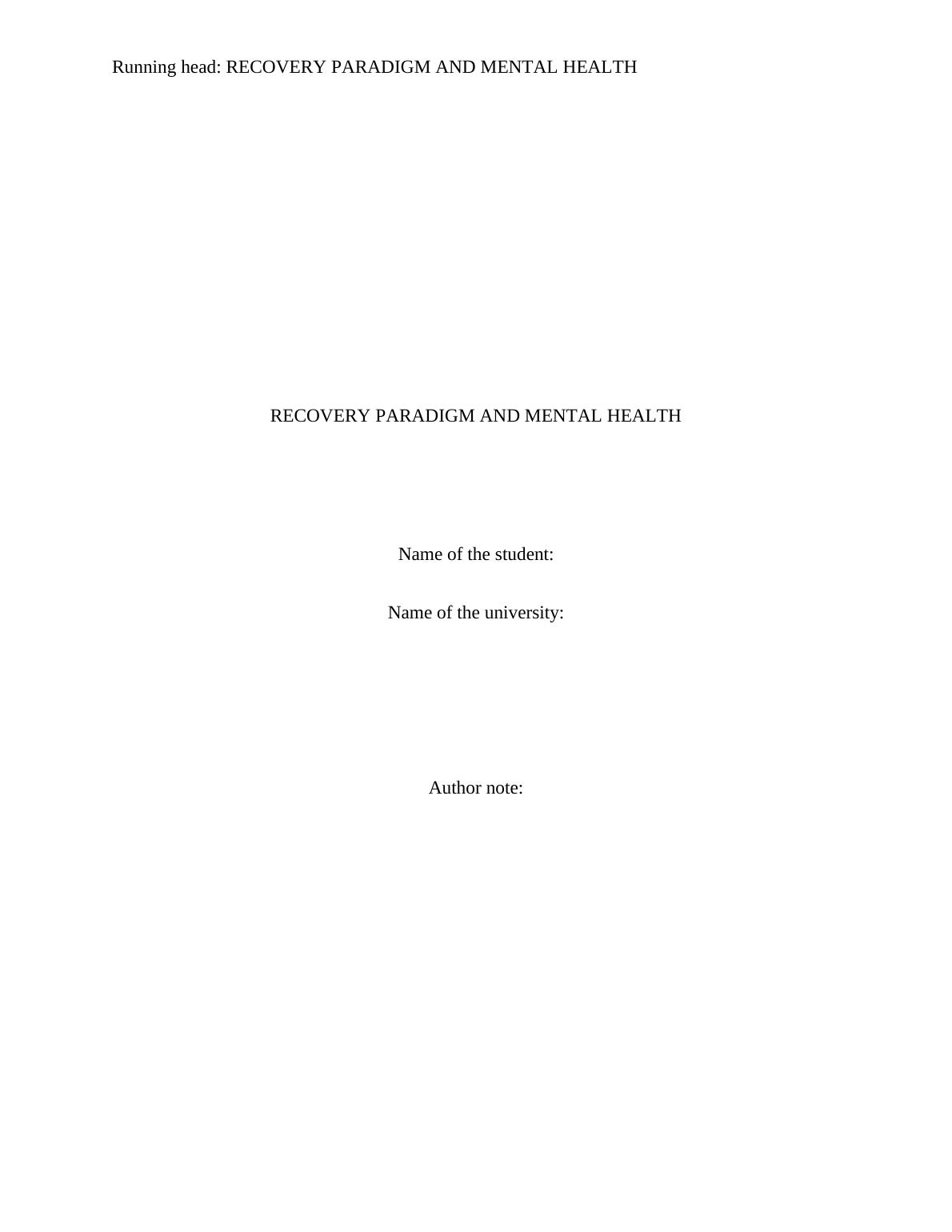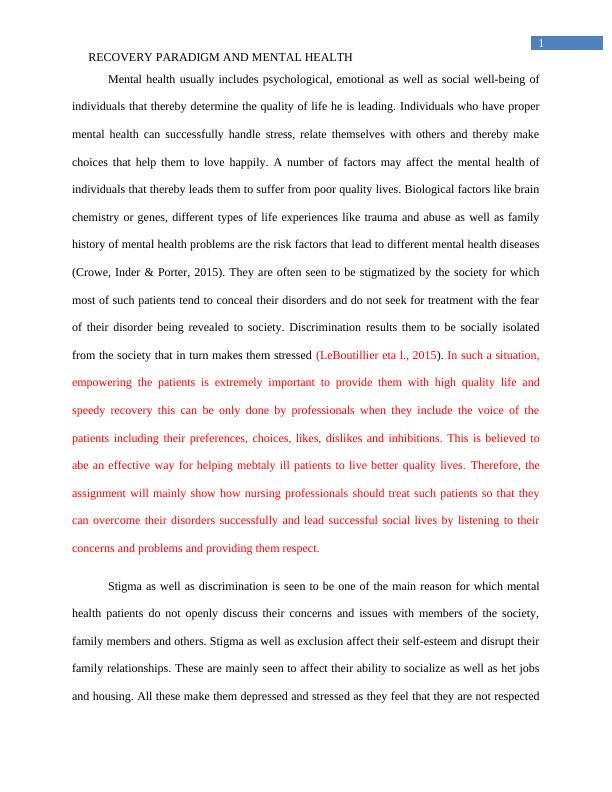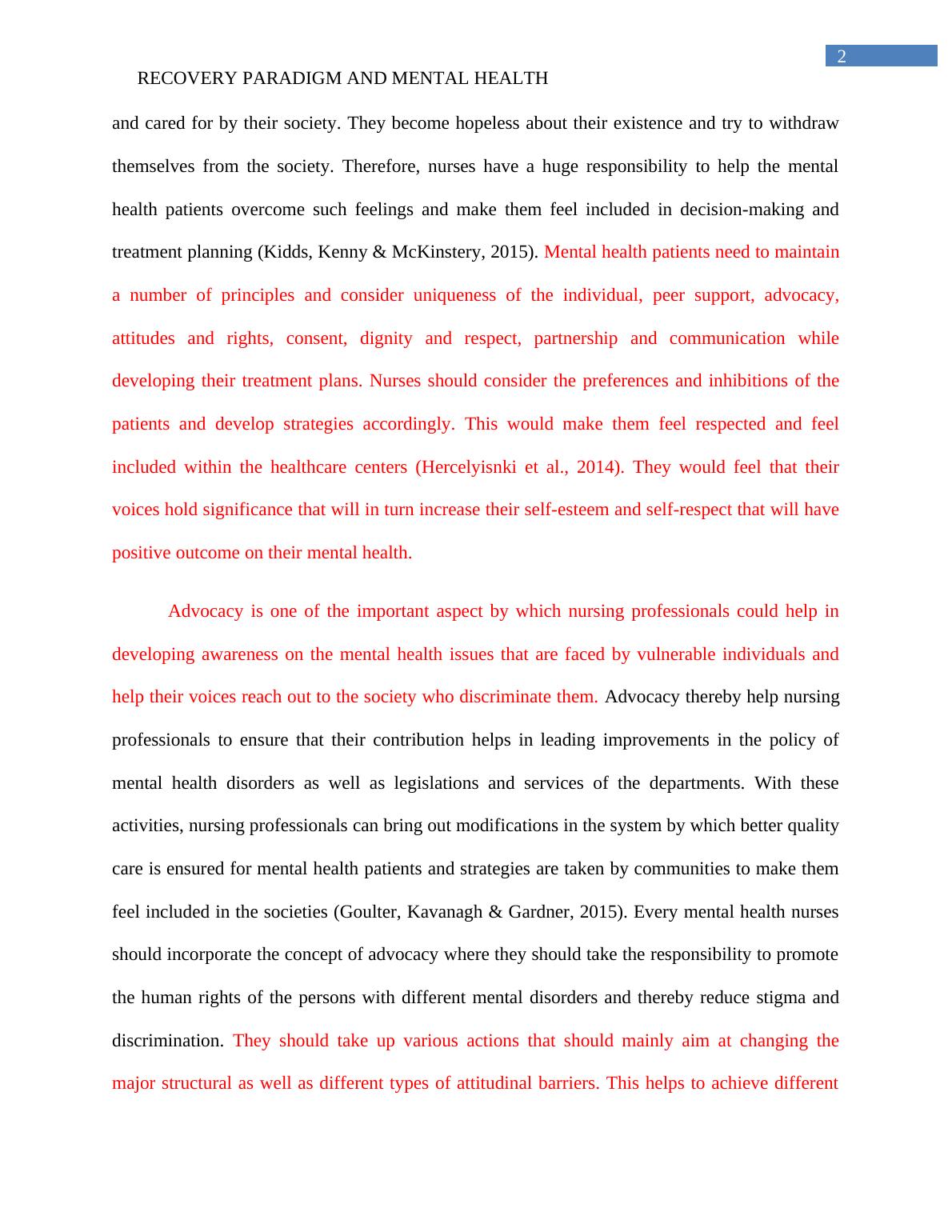Recovery Paradigm Mental Health
Added on 2021-04-17
8 Pages1994 Words73 Views
Running head: RECOVERY PARADIGM AND MENTAL HEALTHRECOVERY PARADIGM AND MENTAL HEALTHName of the student:Name of the university:Author note:

1RECOVERY PARADIGM AND MENTAL HEALTHMental health usually includes psychological, emotional as well as social well-being ofindividuals that thereby determine the quality of life he is leading. Individuals who have propermental health can successfully handle stress, relate themselves with others and thereby makechoices that help them to love happily. A number of factors may affect the mental health ofindividuals that thereby leads them to suffer from poor quality lives. Biological factors like brainchemistry or genes, different types of life experiences like trauma and abuse as well as familyhistory of mental health problems are the risk factors that lead to different mental health diseases(Crowe, Inder & Porter, 2015). They are often seen to be stigmatized by the society for whichmost of such patients tend to conceal their disorders and do not seek for treatment with the fearof their disorder being revealed to society. Discrimination results them to be socially isolatedfrom the society that in turn makes them stressed (LeBoutillier eta l., 2015). In such a situation,empowering the patients is extremely important to provide them with high quality life andspeedy recovery this can be only done by professionals when they include the voice of thepatients including their preferences, choices, likes, dislikes and inhibitions. This is believed toabe an effective way for helping mebtaly ill patients to live better quality lives.Therefore, theassignment will mainly show how nursing professionals should treat such patients so that theycan overcome their disorders successfully and lead successful social lives by listening to theirconcerns and problems and providing them respect.Stigma as well as discrimination is seen to be one of the main reason for which mentalhealth patients do not openly discuss their concerns and issues with members of the society,family members and others. Stigma as well as exclusion affect their self-esteem and disrupt theirfamily relationships. These are mainly seen to affect their ability to socialize as well as het jobsand housing. All these make them depressed and stressed as they feel that they are not respected

2RECOVERY PARADIGM AND MENTAL HEALTHand cared for by their society. They become hopeless about their existence and try to withdrawthemselves from the society. Therefore, nurses have a huge responsibility to help the mentalhealth patients overcome such feelings and make them feel included in decision-making andtreatment planning (Kidds, Kenny & McKinstery, 2015). Mental health patients need to maintaina number of principles and consider uniqueness of the individual, peer support, advocacy,attitudes and rights, consent, dignity and respect, partnership and communication whiledeveloping their treatment plans. Nurses should consider the preferences and inhibitions of thepatients and develop strategies accordingly. This would make them feel respected and feelincluded within the healthcare centers (Hercelyisnki et al., 2014). They would feel that theirvoices hold significance that will in turn increase their self-esteem and self-respect that will havepositive outcome on their mental health.Advocacy is one of the important aspect by which nursing professionals could help indeveloping awareness on the mental health issues that are faced by vulnerable individuals andhelp their voices reach out to the society who discriminate them. Advocacy thereby help nursingprofessionals to ensure that their contribution helps in leading improvements in the policy ofmental health disorders as well as legislations and services of the departments. With theseactivities, nursing professionals can bring out modifications in the system by which better qualitycare is ensured for mental health patients and strategies are taken by communities to make themfeel included in the societies (Goulter, Kavanagh & Gardner, 2015). Every mental health nursesshould incorporate the concept of advocacy where they should take the responsibility to promotethe human rights of the persons with different mental disorders and thereby reduce stigma anddiscrimination. They should take up various actions that should mainly aim at changing themajor structural as well as different types of attitudinal barriers. This helps to achieve different

End of preview
Want to access all the pages? Upload your documents or become a member.
Related Documents
Collaborative Mental Health Nursing Practice Assignment 2022lg...
|10
|2824
|15
The Mental Health Nursinglg...
|9
|2291
|24
(Doc) Dementia - Case Studylg...
|10
|2802
|29
Mental Health: Types, Impact, and Support Serviceslg...
|10
|2394
|490
Impacts of Negative Portrayal of Mass Media on Individuals with Mental Illnesslg...
|12
|2362
|477
Mental Health Nursing Assignment - (Doc)lg...
|13
|3933
|149